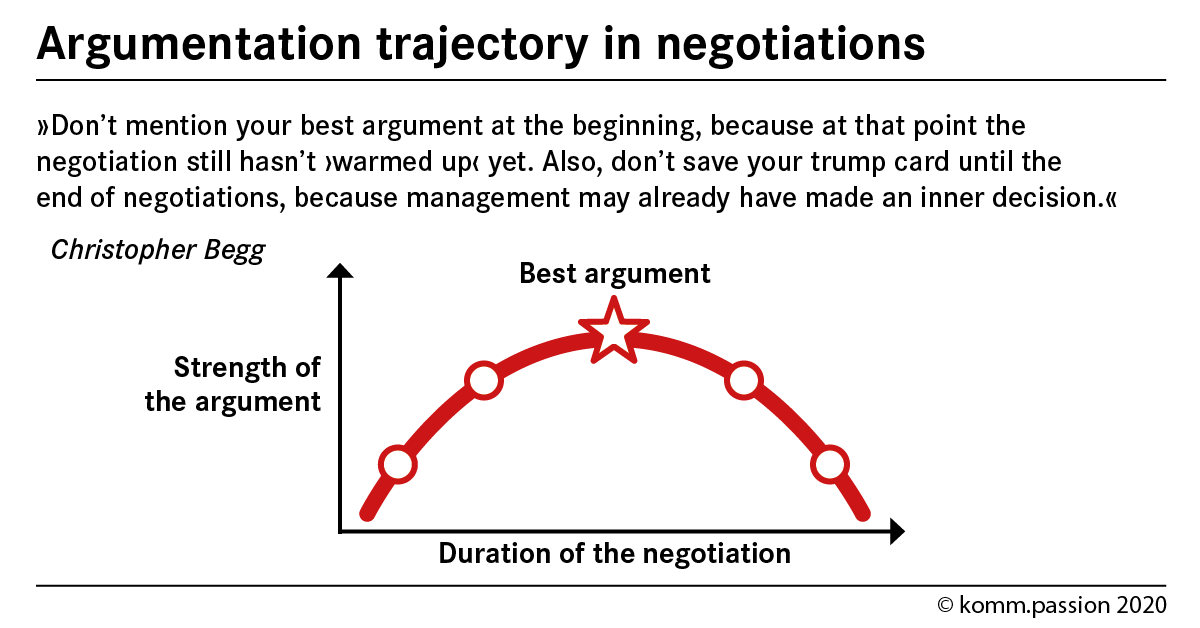Corporate communications in particular often “cost” money without having a noticeable effect on revenue – for example in the area of internal communications toward employees or with matters of image or reputation. The payoff won’t show until the middle or long term. Does that weaken my negotiating position for this uncertain year of 2021?
Everything in companies costs money. Good leadership will think in the middle and long term, especially during crises and difficult situations. Management and marketing theory also abound with plenty of arguments for internal and external communication, internally for example employee motivation, or externally customer trust. It also isn’t like there aren’t any possible ways of measuring success.
All the same, what concrete action recommendations can I implement to strengthen my negotiating position for this uncertain year?
I recommend that company marketing and communications departments work together to come up with a list of arguments that substantiate the departments’ right to exist. The purpose of the field shouldn’t only be anchored idealistically in the heads of marketing and communications staff, but also argumentatively. Because people in other areas of the company often think: “Communications costs a ton and doesn’t achieve anything.” The right arguments will strengthen your negotiating position and hopefully will convince not only company leadership, but also your coworkers.
I still have some budget left over from 2020. Should I “blow it all” quickly in order to use up my entire budget and get at least the same amount for 2021? Or instead should I transparently show why the budget remained open?
I don’t like this game as a facet of planned economics, even though I profit from the spending of open budgets just like the agencies do. Despite that, I’d like to make a clear plea for transparency. I think that transparent communication can lead to a rethinking in the company and progress in the development of the company culture. Of course, for that to work you need to have a board that’s open to logic and argumentation. But obviously I really can’t say anything about the culture of a company. If it’s worked well for the marketing and communications departments to use up their budgets in the past, then obviously they can keep doing that.
Which would you recommend from a tactical perspective: always sketching possible marketing and communication goals for 2021 and then showing the budget needed? Or would you recommend starting with budget planning and then showing what goals this can achieve?
It’s a mix of push and pull on the one hand and the economic principle (minimum/maximum principle) on the other. Both of the approaches you mention in your question make sense when you use them correctly. In practice it usually comes down to a combination of both options through arguments and counterarguments. Budget negotiations often end up taking a similar, almost characteristic course. Fundamentally, the choice of which option to take should be based on the typology of the decision maker.
What does that mean?
If management knows, understands and accepts the goals of marketing and communications, then the first option should be used. In this case, you can use these goals to underpin your budget requests. It also makes sense to start with the goals when the decision makers have rather visionary, idealistic or relational personalities.
In contrast, the second option should be used when you can assume that management won’t faint straight away when it sees the budget amount. Starting with the budget is suitable for dealing with decision makers who are oriented toward controlling or have a technical background.
Does it make sense in 2021 to get together with other strategically compatible departments to fight for a budget together in light of the synergy question?
That depends on what other areas you mean. I think it’s always a good idea when departments that don’t directly interface together get to know each other. This increases understanding of the company’s value chain and of the work others are doing. A consolidation of two departments is also important when it comes to negotiating budgets.
What departments could that be?
For example, I see a useful interface between marketing and sales/key account management. Here establishing consensus with regard to the budget is essential. If the marketing department makes good use of the budget, this will make it easier for sales to support existing customers and acquire new ones. One example of this is good crisis communication, which maintains the trust of your customers. If strategically compatible departments pull together instead of wrangling over funds, then I hope that they won’t even have to fight for the budget, but management will gladly approve it.
Here’s an almost philosophical question: In your view, how much sense do annual budgets make at all in these volatile times? Does annual planning really make sense, or should we be thinking in terms of shorter intervals?
One of my favorite questions and thoughts of recent years. What it’s really about at the core is providing something meaningful and beneficial for customers and employees and about the company’s ability to develop further and be future-proof. When the real question is following the company vision, supporting its mission and making the company values an (albeit perhaps categorical) imperative, then the budget or length of planning intervals is of secondary importance. Obviously money will still play a role and ultimately there’s no way to avoid a discussion about it. When it comes to defending the marketing and communications departments’ monetary requests, then it can be helpful to derive the measures they take from the vision and values of the company. What’s important is that everyone involved is motivated to do their part for the success of the company. On the other hand, the ability to be motivated, solution-oriented and creative is diminished when staff are straitjacketed by the budget.
So my recommendation is: Move away from budgets, time sheets and hourly rates. Tone down your controlling mindset and OKR methods and ask yourself what it’s really about: meaning and value.
Wouldn’t this mean that there would be less negotiating on the whole? Can you really want that as a negotiation trainer?
Here I could offer a ton of evidence for why you should avoid a budget negotiation. Even if this means slightly shooting myself in the foot as a negotiation trainer. The approach of moving away from negotiating toward value-based and oriented persuasion is something that I preach and live out more and more myself as time goes on, too. Some of the aspects of this: Budgets and funds have been allocated for centuries now. There have always been/are a lot of politics in play, with lies being part of securing funds. Connections, likes and dislikes play(ed) a big role. It doesn’t have to be that way. That’s why I believe in value-based persuasion.
Finally: What are your three most important tips for budget negotiations and what are the three biggest no-gos?
Gos:
- Prepare yourself well by working out vision, strategy, goals, bargaining chip, backgrounds, evidence and examples as well as expert arguments and arguments of benefit. Go through the possible counterarguments.
- Be clear about your competence and responsibility as a negotiator and control the situation. Don’t walk into the negotiation with the self-fulfilling prophecy “we’re not going to get this anyway”. Don’t react too emotionally and be honest when you can’t explain or substantiate something.
- Listen! Word for word, sentence for sentence. This gives you endless possibilities to negotiate what’s being said instead of just naming what’s on your sheet. Then you’re also able to ask the right questions, and above all get answers to them. So: Don’t let yourself get distracted, and be sure to take notes on statements, counterarguments and values. Our brains don’t work that well under stress, so notes will help.
No-gos:
- Don’t beg, demand. No negotiating with lots of subjunctives (could, would) or softeners (“Is there maybe the possibility that...”).
- Lying and bluffing. If they call your bluff, you’ll have a tough time for the rest of the negotiation – and the future.
- Delivering unrealistic demands or unjustified demands. Also, you should never negotiate under time pressure, but in doubt postpone if possible.





 KOMM-PASSION.DE
KOMM-PASSION.DE